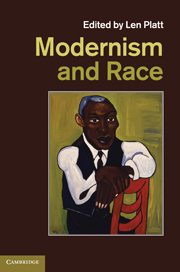Book contents
- Frontmatter
- Contents
- Notes on contributors
- Introduction
- 1 Germanism, the modern and ‘England’ – 1880–1930: a literary overview
- 2 ‘All these fellows are ourselves’: Ford Madox Ford, race and Europe
- 3 ‘’Tis optophone which ontophanes': race, the modern and Irish revivalism
- 4 Generating modernism and New Criticism from antisemitism: Laura Riding and Robert Graves read T. S. Eliot's early poetry
- 5 Race, modernism and the question of late style in Kipling's racial narratives
- 6 Atlantic modernism at the crossing: the migrant labours of Hurston, McKay and the diasporic text
- 7 Claude McKay in Britain: race, sexuality and poetry
- 8 Wyndham Lewis and the modernists: internationalism and race
- 9 ‘Until Hanandhunigan's extermination’: Joyce, China and racialised world histories
- 10 Race, gender and the Holocaust: traumatic modernity, traumatic modernism
- Index
- References
8 - Wyndham Lewis and the modernists: internationalism and race
Published online by Cambridge University Press: 03 May 2011
- Frontmatter
- Contents
- Notes on contributors
- Introduction
- 1 Germanism, the modern and ‘England’ – 1880–1930: a literary overview
- 2 ‘All these fellows are ourselves’: Ford Madox Ford, race and Europe
- 3 ‘’Tis optophone which ontophanes': race, the modern and Irish revivalism
- 4 Generating modernism and New Criticism from antisemitism: Laura Riding and Robert Graves read T. S. Eliot's early poetry
- 5 Race, modernism and the question of late style in Kipling's racial narratives
- 6 Atlantic modernism at the crossing: the migrant labours of Hurston, McKay and the diasporic text
- 7 Claude McKay in Britain: race, sexuality and poetry
- 8 Wyndham Lewis and the modernists: internationalism and race
- 9 ‘Until Hanandhunigan's extermination’: Joyce, China and racialised world histories
- 10 Race, gender and the Holocaust: traumatic modernity, traumatic modernism
- Index
- References
Summary
In relation to the question of race, Wyndham Lewis is frequently seen as one of the triumvirate of antisemitic Anglo-American modernists alongside Pound and Eliot. Indeed these three figures provide a fascinating series of case studies. Their political-theoretical allegiances contrast in important ways, but as a group they still participate in a matrix of right-wing thought which was for them emergent in the 1920s and 1930s, but which for the present-day observer acquires the part-illusory constitution of an objectively completed process. The mechanisms of professional and other investment in these three authorships through previous decades have always made fraught the examination of race as an issue within individual oeuvres and across the fields of association in which these authorships are involved. Some methodological clarification might eventually lay the foundation for some conceptual remodelling which will move beyond and behind the heavily foregrounded topic of antisemitism to view more broadly the negotiation of concepts of race and nation against a background of internationalist idealism, a central mark of modernism in the interwar period.
Before commenting on the different modalities in which antisemitism appears in the work of each of these authors, it is necessary briefly to make suggestions regarding the construction of antisemitism. First, it might be said that antisemitism so-called cannot readily be construed as racism according to the nineteenth-century concept of scientific racism which in general supplies the model for the construction of racism as an object by administrative authorities in our own time.
- Type
- Chapter
- Information
- Modernism and Race , pp. 156 - 172Publisher: Cambridge University PressPrint publication year: 2011
References
- 1
- Cited by



